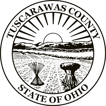About the Treasurer's Office
The County Treasurer’s office plays a vital role in the lives of Tuscarawas County residents. The office collects more than $140 million in taxes each year. This revenue is critical to schools, libraries, parks, municipalities and to the Tuscarawas County government itself, which provides a myriad of social services to county residents. The Treasurer’s Office manages an investment portfolio of more than $65 million.
Treasurer’s Duties
History of the Treasurer's Office
The office of county treasurer was established when the first county was formed under the Northwest Territory Act of 1792. The Treasurer was appointed by the territorial governor and his duties were specifically defined by statute. The office of treasurer became elective in 1827. The term was changed several times by legislative acts and was set at four years in 1936.
Until 1906, the treasurer’s remuneration was entirely from fees. Since then the salary has been determined by law, according to the population of the county. Law requires the treasurer to be bonded. The amount of bond is set by the county commissioners.
All county funds are entrusted to the treasurer. The treasurer makes daily deposits of all monies collected. Funds not immediately used are invested by his office. He redeems all warrants properly certified by the county auditor, and is required to provide a daily financial statement to the county auditor. The county treasurer is the official custodian of the surety bonds required of most bonded county officials. He is a member of the County Budget Commission, the County Board of Revision, the County Data Processing Board and the Investment Advisory Board.
The county treasurer collects all county taxes including real estate, tangible personal property, manufactured home, estate tax, and cigarette tax. His tax collection duties begin when he receives a duplicate of property tax assessments from the county auditor. He then prepares a notice that taxes are due and payable to him. After each semi-annual collection of taxes, the treasurer must submit a report to the auditor, indicating the amount of taxes collected since the last tax settlement in each taxing district in the county. The auditor then issues a warrant to the clerk of any subdivision or legally constituted board authorized by law to receive such funds, all money in the treasury belonging to such boards or subdivisions. Upon presentation of the proper warrant, the treasurer makes payment of the certified amount to said board or subdivision.
The treasurer keeps records of the general tax duplicate (including special assessments), a delinquent real estate tax duplicate containing full information on taxpayers for foreclosure proceedings, a duplicate of tangible personal property with detailed information on delinquencies. He keeps records of cigarette taxes, estate (inheritance) tax, manufactured home tax, and pay-in orders. The treasurer must keep a detailed record of all warrants redeemed and all monies gained by interest on investments of county funds. The treasurer is subject to supervision of the state auditor, being required to keep his accounts according to a uniform system (Ohio Revised Code) set up for all public offices in the State.
County Treasurers from 1808 to Present
1808-1811 David Peter
1811-1823 Peter William
1823-1836 Gabriel Cryder
1836-1842 Jacob Overholtz
1842-1846 Joseph Demuth
1846-1850 Edward Peter
1850-1853 John Buthler
1853-1858 Simpson Harmount
1858-1860 Levi Sargent
1860-1864 Henry Anderman
1864-1866 Martin Hagan, Jr.
1866-1870 Nicholas Montag
1870-1874 William H. Crisswell
1874-1878 Josiah Murphy
1878-1882 John A. Wagner
1882-1886 John L. Kennedy
1886-1890 John Myers
1890-1894 Christian C. Forney
1894-1898 William B. Hochstettler
1898-1902 James A. Slingluff
1902-1907 Samuel Roser
1907-1911 William A. Wagner
1911-1915 Charles H. Ley
1915-1919 John A. Lineberger
1919-1923 Arthur S. Romig
1923-1927 Robert N. Walter
1927-1929 Fred W. Lautzenheiser
1929-1931 J. W. McCombs
1931-1933 Fred W. Lautzenheiser
1933-1937 C. E. Becker
1937-1945 Walter E. Geib
1945-1973 Victor E. Martinelli
1973-2001 Don W. Levengood
2001-Present Jeffery S. Mamarella
Omitted from the constitution of 1802, the office of Treasurer was created by legislative act in 1803 (I.O.L. 98) appointive by the associate Judges in 1803, and annually, by the County Commissioners from 1804-1827 when the office became elective for two year terms. In 1859 the General Assembly made the term two years (560 L. 105). In 1936 it was increased to four years, as at present (116 O.L. pt ii 184).
